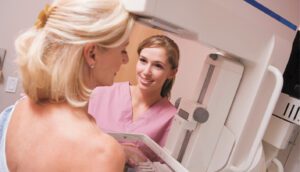By Chand Rohatgi, MD
 In the United States, approximately 310,000 women will be diagnosed with breast cancer in 2025 alone. Even more sobering is the fact that about 1 in 8 women will develop breast cancer during their lifetime, making it the most common cancer among women after skin cancer.
In the United States, approximately 310,000 women will be diagnosed with breast cancer in 2025 alone. Even more sobering is the fact that about 1 in 8 women will develop breast cancer during their lifetime, making it the most common cancer among women after skin cancer.
“Early detection remains our most powerful weapon against breast cancer,” said Dr. Rohatgi, MD, a UF Health breast surgeon specializing in oncology. “When caught in its earliest stages, breast cancer responds better to treatment, leading to significantly improved survival rates.”
As we commemorate Breast Cancer Awareness Month, Dr. Rohatgi emphasizes the critical importance of knowing what to look for and maintaining regular screening schedules.
“Women should be familiar with the normal look and feel of their breasts,” explains Dr. Rohatgi. “Watch for any new lumps, skin changes, including dimpling or puckering, nipple discharge or persistent pain in one area. These warrant immediate medical attention.”
While breast self-exams are valuable, they don’t replace clinical screenings. Dr. Rohatgi stresses that mammograms can detect cancers up to two years before they become palpable.
Beyond obvious lumps, Dr. Rohatgi recommends being alert to these additional warning signs of breast cancer.
“Pay attention to changes in breast size or shape, skin irritation or redness, nipple retraction, swelling in the armpit area, or any persistent discomfort,” he advises. “These symptoms don’t automatically mean cancer, but they deserve prompt investigation.”
Regular mammograms form the foundation of effective breast cancer detection. Women should begin annual or biennial mammograms at age 40, or earlier if they have risk factors such as family history or genetic mutations.
“Many women skip routine mammograms because they feel fine or find them uncomfortable,” notes Dr. Rohatgi. “But breast cancer often develops silently, with symptoms appearing only in advanced stages. By then, treatment options may be more limited and less effective.”
Dr. Rohatgi emphasizes that breast cancer survival rates have improved dramatically over recent decades, with death rates falling steadily since the early 1990s. This progress stems largely from better screening protocols leading to earlier detection.
“Today’s breast cancer survivors – numbering over 4 million in the United States alone – are a testament to the power of vigilance and medical advancement,” Dr. Rohatgi explains. “Breast Cancer Awareness Month celebrates these victories while reminding us all that proactive health monitoring saves lives.”
For those with a family history of breast cancer, Dr. Rohatgi recommends discussing personalized screening schedules with healthcare providers, as genetic factors may necessitate earlier or more frequent testing, including breast MRI or genetic counseling.
“Breast cancer screening guidelines continue to evolve as we learn more about risk factors and detection methods,” notes Dr. Rohatgi. “What remains constant is that early intervention dramatically improves outcomes. The difference between catching breast cancer at stage one versus stage three or four can literally be lifesaving.”
Dr. Rohatgi also emphasizes the importance of lifestyle factors in breast cancer prevention. Maintaining a healthy weight, limiting alcohol consumption, staying physically active, breastfeeding if possible, and limiting hormone therapy can all reduce breast cancer risk.
“While we cannot control all breast cancer risk factors, many are within our power to modify,” he adds. “These healthy habits complement regular mammograms to create your strongest defense against breast cancer.”
Remember: when it comes to breast cancer, knowledge and action are your strongest allies.
As a board-certified breast surgeon at UF Health, I serve patients across central Florida with specialized care for cancerous and noncancerous breast conditions. “My patients drive my energy,” and I remain committed to the latest medical guidelines and technologies to provide optimal care.
Previously, I established a comprehensive breast care center in Easton, Pennsylvania, offering in-house mammography, biopsies, lymphedema therapy, and genetic testing. During my nearly two-decade professorship at Drexel University College of Medicine, I received the Dean’s Special Award for Teaching Excellence four times.
I completed my medical education in Varanasi, India, with surgical training in India and New Jersey, before finishing my residency as chief resident at Easton Hospital in Pennsylvania.
Outside medicine, I volunteer with the American Cancer Society—receiving their St. George National Award in 2014—and at my community’s historic State Theater. While I enjoy cultural travel, my greatest joy comes from time spent with my wife, three children, and extended family.
For questions or to learn more, visit our website UFHealth.org/conditions-and-treatments/breast-cancer/central-florida or call 352.323.5665.
 Central Florida Health and Wellness Magazine Health and Wellness Articles of the Villages
Central Florida Health and Wellness Magazine Health and Wellness Articles of the Villages



